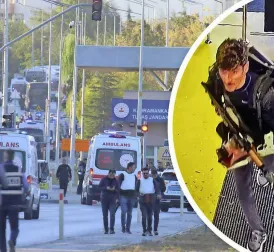

The History of PKK: A Closer Look at the Kurdish Movement
ankara, turkey, syria, iraq - Learn about the history and evolution of the Kurdish movement PKK led by Abdullah Ocalan, its struggles against Turkish oppression, and the ongoing conflict between PKK and the Turkish government.
The PKK, Partiya Karkerên Kurdistan (literally: Workers' Party of Kurdistan), was founded in 1978 by a group of Kurdish students led by Abdullah Ocalan. The party is both Kurdish nationalist and Marxist, aiming to combat Turkish colonialism.
Two years later, on September 12, 1980, a military coup was staged by the Turkish army, followed by a new constitution in 1982 that suppressed everything Kurdish. Kurdish language and cultural expressions were banned, leading to deep frustrations among the Kurdish population in southeastern Turkey.
In August 1984, PKK initiated its first attacks on police stations in several southeastern Turkish towns. The Turkish military retaliated, sparking a massive conflict that put the Kurdish population in the crossfire between PKK and the Turkish army.
PKK militants who were captured were tortured in the notorious Diyarbakir prison. The Turkish army razed three thousand Kurdish villages to the ground, accusing residents of collaborating with PKK.
However, the Turkish army also found Kurdish collaborators who were willing to work for payment: the village guards who knew the local terrain well and could act as scouts.
PKK's tactics were equally ruthless. They not only targeted Turkish military personnel but also killed local Kurdish residents who refused to cooperate. Dissidents and even teachers were murdered. Initially, even tourists were targeted.
The reasoning given by PKK was that purchasing a ticket for Topkapi in Istanbul indirectly funded the Turkish army, making the buyer complicit. Consequently, PKK found itself listed as a terrorist organization not only in Turkey but also in the EU and the US.
During the conflict between the Turkish military and PKK, over 40,000 people, primarily Kurds, lost their lives. There was a glimmer of hope for a political solution during the tenure of Turkish President Turgut Özal, who had Kurdish roots. However, his death in 1993 – possibly due to poisoning – disrupted the peace process.
Meanwhile, PKK leader Abdullah Ocalan was based in Syria. Turkey's threats to cross the border and retrieve him led to his relocation from Syria to Moscow and eventually Rome, where he gave interviews.
Turkey unsuccessfully sought Ocalan's extradition from Italy. In a twist, Ocalan was subsequently moved to the Greek Embassy in Nairobi, Kenya. The Turkish secret service lured him out and abducted him in February 1999, bringing him back to Turkey.
Then Turkish Prime Minister Ecevit triumphantly announced Ocalan's capture, who was imprisoned on Imrali Island in the Sea of Marmara and initially sentenced to death. Turkey, aiming to join the EU, commuted the sentence to life imprisonment to meet EU entry criteria.
Ocalan instructed PKK fighters to retreat to the impregnable Kandil Mountains in northeastern Iraq, which remains the PKK's primary military stronghold.
In 2013, Ocalan declared an end to armed conflict, raising hopes for peace. However, the Syrian civil war brought new challenges, as ISIS emerged. Turkey facilitated the movement of ISIS militants into northern Syria, where they clashed with the YPG, the Syrian branch of PKK.
The YPG, much like the broader PKK, notably includes numerous female fighters. In northern Syria, male ISIS extremists frequently engaged in combat against female communist Kurdish nationalists, garnering Western sympathy for the latter, especially due to their aid to thousands of Yazidis victimized by ISIS.
Support from the US and Russia further bolstered the YPG, triggering Turkish ire as they accused their NATO ally of backing PKK. Turkey faced accusations of aiding ISIS, which Ankara vehemently denied.
To prevent PKK attacks from neighboring countries, the Turkish military frequently crossed into Iraq and Syria. Ankara aimed to establish buffer zones in these regions as a preemptive measure.
Despite recurring bans and allegations of ties to PKK, a Kurdish party consistently maintains a presence in the Turkish parliament, often perceived as PKK's political arm. Even after bans, the group resurfaces under different names.
Surprisingly, Devlet Bahceli, leader of the right-wing MHP and Erdogan's coalition partner, proposed Ocalan's release if he renounced terrorism and dismantled PKK publicly. Subsequently, a bloody attack occurred, indicating that the PKK conundrum is far from over.


Leave a comment